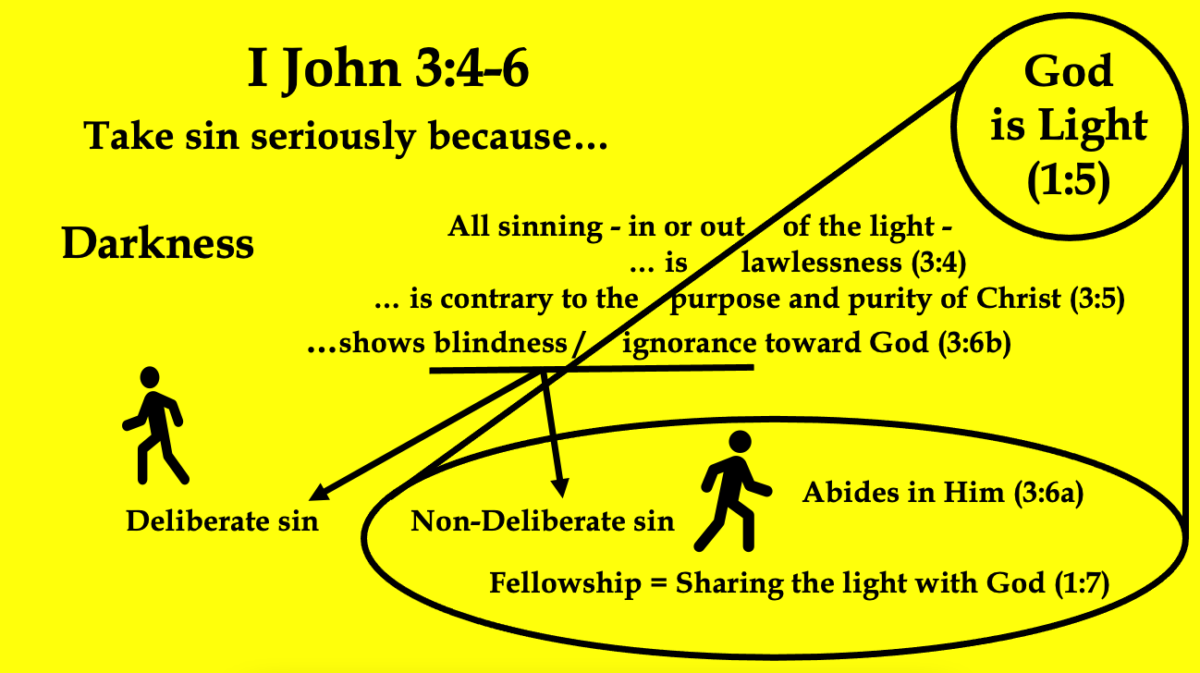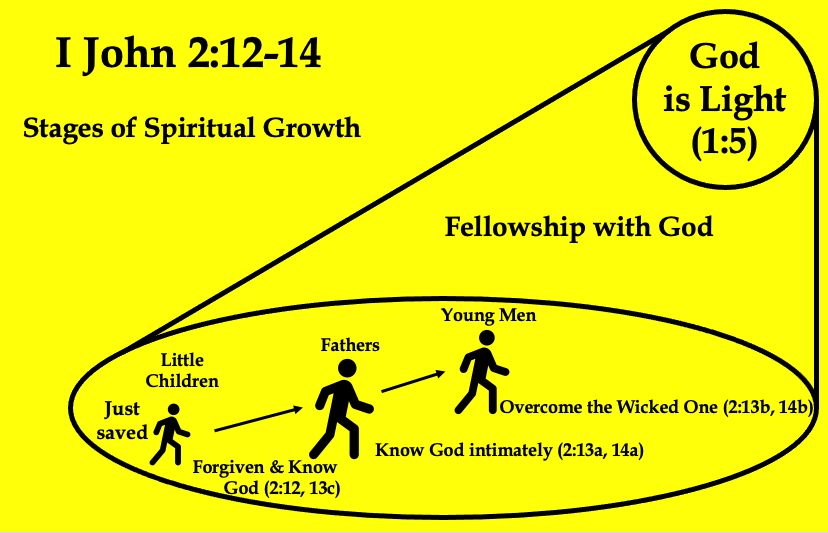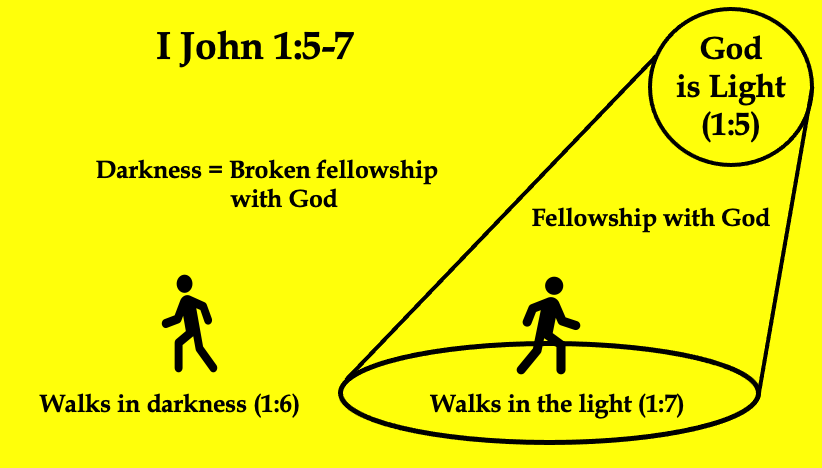“Whoever abides in Him does not sin. Whoever sins has neither seen Him nor known Him.” I John 3:6
In the body of his epistle the apostle John explains how we can have more confidence and less shame at the time of Christ’s coming (2:28-4:19). He begins by providing some practical teaching about our new identity in Christ (3:1-10). Since God is righteous by nature (2:29), we can now share in His righteousness through the new birth which has changed who we are at the core of our being. We are now God’s children (3:1a). The world does not understand this new nature because they have not experienced the new birth (3:1b). John goes on to explain that the time is coming when this new nature will be the only nature we manifest because our sinful nature will be taken away and we will receive a new glorified body like that of the Lord Jesus at the time of His return (3:2; cf. Phil. 3:20-21). The certainty that we will be completely conformed (both spiritually and physically) into the image of Christ in the future motivates us to live for the Lord now (3:3).
John wants his Christian readers (2:12-14; 5:13) to change the way they think about sin (3:4-6) because sin can rob Christians of the abundant life Jesus came to give them on earth (cf. John 10:10). Notice I did not say that sin can rob a Christian of heaven. 1 Entering heaven is based on believing in Jesus Christ and His death on the cross which finished paying our sin debt to God in full (I John 5:1, 13; cf. John 3:5-18, 36; 19:30). The book of I John is about how to have fellowship or intimacy with Christ (1:3-4), not about how to get to heaven. John’s concern is that the antichrists or false teachers (2:18-27) were trying to “deceive” John’s readers not to take sin seriously (3:7), 2 which would disrupt their fellowship with God. Hence, John begins this section by addressing the character of sin.
He writes, “Whoever commits sin also commits lawlessness, and sin is lawlessness.” (I John 3:4). Sin is the very opposite of Christ’s purity and the hope believers have of becoming like Him (3:2-3). All “sin” (hamartia) is “lawlessness” (anomia) 3 or wickedness. 4 When a Christian (or non-Christian) sins, he or she becomes a lawbreaker. It does not matter if you sin once or a thousand times; sin is an act of rebellion against God. 5
The apostle wants to open our eyes to the wickedness of sin. It is revolting to God whether it is a little white lie or a violent murder. It sickens God to look at our sin because He is completely holy, and sin is the exact opposite of His holiness. It also sickens God to see Christians tolerate sin in their lives as though it were no big deal. We may justify our sin by telling ourselves, “No one is perfect.” “Everyone is doing it.” “No one will ever know, so it won’t hurt anyone.”
Look at the contrast between man’s rationalization of sin and God’s repulsion of sin:
Man calls it an accident; God calls it an abomination.
Man calls it a blunder; God calls it blindness.
Man calls it a defect; God calls it a disease.
Man calls it a chance; God calls it a choice.
Man calls it an error; God calls it enmity.
Man calls it a fascination; God calls it a fatality.
Man calls it infirmity; God calls it iniquity.
Man calls it luxury; God calls it leprosy.
Man calls it liberty; God calls it lawlessness.
Man calls it a trifle; God calls it a tragedy.
Man calls it a mistake; God calls it madness.
Man calls it a weakness; God calls it wickedness. 6
Instead of rationalizing our sin, God want us to confess and forsake it (Prov. 28:13). Again, this is not to get to heaven, but to have intimate fellowship with the Lord on earth. The consequences of not taking sin seriously can be deadly. Anderson illustrates this:
“There is a small tree which grows in SE Asia known as the Judas-tree. Long before its leaves appear, gorgeous blossoms grow on its branches. Looking like scarlet sunbeams caught among the boughs, the brilliant beauty of the crimson flowers attracts thousands of tiny insects. The wild bees also seek to draw honey from the exquisitely shaped cups.
“But every insect—bee or butterfly—that comes to rest upon the edge of its blossom is overcome by a fatal, curious sort of opiate, or drug, which the flower- juice contains, and drops dead upon the ground below! So, when walking around Judas-trees, a person sees the soft grass covered with dead and dying, bright-winged insects.
“The Judas-tree reminds us of sin. Sin may look bright, pleasant, and attractive to our eyes; it may appear harmless to indulge in it. But lurking behind the “pleasure of sin” is a fatal poison. And sin is a poison, a wickedness that acts as a drug to take away all our motivation for the Christian life, or worse. Wickedness: that’s the character of sin.” 7
Failure to take sin seriously conflicts with the purpose and purity of Jesus Christ Who came to completely remove sin from our lives. Sin is antichrist. John writes, “And you know that He was manifested to take away our sins, and in Him there is no sin.” (I John 3:5). Jesus not only came to save us from the full penalty of our sins when He died on the cross (John 19:30; Rom. 5:9a, 10a; 6:23a; I Cor. 15:3), but He rose from the dead to live inside us to save us from the power of sin in our daily Christian lives (Rom. 5:9b, 10b; James 1:21-25). The day is coming in eternity when Christ will deliver us from the presence of sin in our lives forever (I John 3:2; Rev. 21:4).
The reason Jesus is qualified to do all this for us is because “in Him there is no sin” (3:5b). There was absolutely no sin in the perfect Son of God because He is fully God (I John 5:20; cf. John 1:1, 34, 49; 5:16-47; 6:69; 8:57-59; 11:27; 20:28; Rom. 9:5; Titus 2:13; Heb. 1:8; et al.) and fully Man (I John:1:1-2; 4:2-3; cf. John 1:14; 4:6; 11:35; 12:27; 19:28; I Tim. 2:5).It took a perfect sacrifice to satisfy God’s holy demand to punish the sins of the world. And Jesus was the only Person qualified for the job (I John 2:1-2; cf. John 1:29; 2 Cor. 5:21; Heb. 4:15; I Pet. 3:18).
Although every Christian has sin in their lives (I John 1:7-8, 10), sin is abnormal and unnatural to the Christian life (Rom. 6:1-4). In fact, it is contrary to the purity of Jesus Christ (I John 3:3, 5). Therefore, it must not be condoned or tolerated in a believer’s life.
A few years ago, my family and I visited a church in North Dakota during the summer that was part of a German community. I was so impressed with how everyone seemed to be concerned about the cleanliness of their town. All the lawns were neatly mowed, and the sidewalks were swept and free of grass trimmings. Flowers were strategically planted without a weed in sight. There were no beer cans laying around nor any garbage on the side of the roads. People seemed to take a lot of pride in keeping their community looking clean and tidy.
When we left that place, I wondered what would happen if I showed more concern for the cleanliness of my heart than those people showed for their community? Inward cleanliness leads to outward cleanliness in the eyes of the apostle John. The righteous nature of God which was given to us the moment we believed in Christ (Rom. 4:5; I John 2:29; 5:1, 13), is to be manifested outwardly in our practice – not so we can get to heaven, but so God is glorified before people on earth (cf. Matt. 5:16).
Failure to take sin seriously is contrary to abiding in Christ Who is a sinless Person. “Whoever abides in Him does not sin. Whoever sins has neither seen Him nor known Him.” (I John 3:6). John has just said there is absolutely “no sin” in Jesus(3:5). It follows that a Christian who “abides in” Christ (a sinless Person), absolutely “does not sin” (3:6). John is saying that sin is never the product of having fellowship or intimacy with Christ (“abides in Him”).Remember “abides” (menō) is one of John’s favorite words for fellowship or intimacy with Jesus.
Unfortunately, many Bible interpreters fail to see this logical connection between the absolute present tenses in verses 5 and 6.They conclude that verse 6 means if a person who claims to be a Christian continues to sin, he or she is not truly saved. The NIV translation conveys this interpretation by inserting the words “keeps on” and “continues” in front of the present tense verbs: “No one who lives in him keeps on sinning. No one who continues to sin has either seen him or known him.” (I John 3:6 NIV). However, continual action is not inherent in the Greek present tense. The translators have added these additional words based on their theological point of view, not a careful study of the Greek grammar. 8
“For example, Jesus refers to His single act of coming to the earth at His incarnation in the present tense in John 6:33 when He says, ‘For the bread of God is He who comes down from heaven and gives life to the world.’ Is there anyone who would like to tell us that the present tense here means continuous action, that is, that Jesus is continually coming down from heaven? I don’t think so. The present tense can mean continuous action, but that is only one of its ten different uses, and it’s a fairly rare usage. There need to be other indicators in the context of the verb before we conclude that the meaning is continuous action.” 9
“It cannot be shown anywhere in the New Testament that the present tense can bear this kind of meaning without the assistance of other words.” 10
It is best to understand I John 3:6a in an absolute sense (“no one who abides in Him sins”) because the present tense (“no one… sins”) in the New Testament never bears the habitual meaning (“no one keeps on sinning”) without the assistance of qualifying words like diapantos (“continually”- Luke 24:53; Heb 9:6; 13:15); eis to diēnekes (“continually”- Heb 7:3; 10:1); 11or pantote (“always”). First John 3:6a has no qualifying words.
In the immediate context John affirms that “in Him (Christ) there is no sin” (3:5). Clearly this is an absolute denial of sin in God’s Son. Therefore, the present tense in 3:6a is also an absolute denial of sin in the person who abides in Christ. One cannot abide in a sinless Person (3:5) and sin at the same time.
To say that verse 6 means a genuine Christian will not continue to sin contradicts I John 1:8 which says, “If we say that we have no sin, we deceive ourselves, and the truth is not in us.” Since John includes himself and the other apostles with the use of the word “we” in this verse (1:8; cf. 1:1-7), he must be referring to genuine Christians who say they have no sin and are thus self-deceived. 12 Both I John 1:8 and 3:6 refer to genuine Christians.
But what does John mean when he says, “Whoever sins has neither seen Him nor known Him” (I John 3:6b)? To properly understand John’s meaning, we need to turn to the Greek grammar like we did in I John 2:3-4. Once again, the apostle John uses the Greek perfect tense with the verbs “seen” (heōraken) and “known” (egnōken). You may recall that with “verbs describing a state of being (to know) as opposed to verbs of action (to hit), the perfect tense expresses an intensified state. In other words, ‘to know’ in the perfect tense becomes ‘to know intensively’ or intimately. ‘To see’ in the perfect tense becomes ‘to see very closely.’” 13
John is telling us that “whoever sins” (a Christian or non-Christian) – whether it is once or a thousand times – means he or she “has neither seen” Christ closely “nor known Him” intimately. These verbs describe close fellowship with Christ. Sin is never the result of having intimate fellowship with Jesus. When a person “abides” in Christ, he or she has “seen” Him more closely and “known” Him more intimately. Sin is never the product of seeing and knowing Christ in a fellowship sense.
John is not saying that a person who sins has “never” seen or known God. For example, if you see a person with a starving look on his or her face, you can conclude they have not eaten recently, but you cannot conclude they have never eaten. A person sins in the “darkness” (1:6) where he or she is not seeing or knowing God more intimately. Sin is a result of blindness or ignorance toward God. But this does not mean he or she has never walked “in the light” (1:7) where God is seen or known more intimately.
Someone may argue that this absolute denial of sin in the person who abides in Christ also contradicts I John 1:8 which says a Christian who denies he has sin is self-deceived. Hodges comments, “First John 1:8 makes it clear that no Christian can ever claim to be experientially completely free from sin in this life. But at the same time the experience of ‘abiding in Him’ is a sinless experience. One area of obedience is not ‘contaminated’ by the presence of sin in other areas. If a person obeys the command to love his brother, that obedience is not tainted in God’s sight by some different sort of failure in the life, such as a lack of watchfulness in prayer (cf. Eph 6:18).
“When a believer is walking in fellowship with God, He is able to look past all his failures and sin and see the actual obedience that is there. In 1:7 John explained that even while walking in the light, there is cleansing going on by virtue of the blood of Christ. As a believer walks in the light and does what God commands, God sees him as one who is totally cleansed and is without any charge of unrighteousness.
“Thus, when a believer abides in Him, the positive obedience is what God takes account of and recognizes. The sin that still remains is not in any sense sourced in the abiding life, and that sin is cleansed in accord with 1:7. The experience of ‘abiding’ is therefore equivalent to obedience.” 14
Hodges also writes, “The fact remains, however, that Christians do not experience the sinless life perfectly on this earth; hence 1:8, 10 remain true. The two ideas are not really incompatible. The Christian still experiences a genuine struggle with the flesh and overcomes its impulses only by the help of the Holy Spirit (cf. Gal. 5:16-26).
“Paul’s thinking also conforms with this view. In his struggle with sin, he was able to conclude, ‘Now if I do what I do not want to do, it is no longer I who do it, but it is sin living in me that does it’ (Rom. 7:20). In this way Paul could perceive sin as not a real part of what he was at the most inward level of his being (cf. Rom. 7:25). When he wrote, ‘I no longer live, but Christ lives in me’ (Gal. 2:20), he implied the same thing. If Christ alone really lives, sin can be no part of that experience. Insofar as God is experienced by a believer, that experience is sinless.” 15
In summary, God wants us to take sin more seriously because…
- The character of sin is repulsive to God (3:4).
- Sin conflicts with the purpose and purity of Christ (3:5).
- Sin is contrary to abiding in Christ (3:6).
To knowingly and willfully sin makes us a stranger to Jesus Christ because Christ is sinless. One cannot abide in a sinless Person and sin. Sin is never the product of abiding in Christ. That is, one cannot deliberately sin and be close to Christ at the same time. A believer in close fellowship with Christ wants sin out of his life. But a Christian who takes sin lightly in his life does not know Christ intimately. If he did, he would take sin more seriously.
Prayer: Heavenly Father, thank You for wanting us to take sin more seriously because it can rob us of the joy of seeing You more closely and knowing You more intimately. Too often we can take sin lightly because we are not in fellowship with You. If we were close to You, we would be sickened by our sin as You are. Please help us to see You more closely and to know You more intimately so we will want sin out of our lives. Our sin is a big deal because it caused Jesus to suffer and die in our place on a cross so we could be forgiven when we believe in Him. By Your grace, may each of us abide in Christ and have close fellowship with Him so we can live a life that is honoring to You. In Jesus’ name, we pray. Amen.
ENDNOTES:
1. David R. Anderson, Maximum Joy: I John – Relationship or Fellowship? (Grace Theology Press, 2013 Kindle Edition), pg. 145.
2. Zane C. Hodges, The Bible Knowledge Commentary Epistles and Prophecy, Editors John F. Walvoord and Roy B. Zuck (David C. Cook, 2018 Kindle Edition), Kindle Location 3795.
3. Walter Bauer, A Greek-English Lexicon of the New Testament and Other Early Christian Literature: Third Edition (BDAG) revised and edited by Frederick William Danker (Chicago: University of Chicago Press, 2000 Kindle Edition), pg. 85.
4. Anderson notes, “This Greek word is used to translate twenty-four different Hebrew words in the Septuagint (the Greek translation of the Hebrew OT). Most frequently it is used to translate the Hebrew word ‘awon, which means “wickedness” or “iniquity” (Anderson, Maximum Joy, pg. 147).
5. Tony Evans, CSB Bibles by Holman, The Tony Evans Bible Commentary (B & H Publishing Group, Kindle Edition, 2019), pg. 2942.
6. Anderson, Maximum John, pp. 147-148.
7. Ibid., pg. 148.
8. Ibid., pg. 151.
9. Ibid., pp. 146-147.
10. Hodges, The Bible Knowledge Commentary Epistles and Prophecy, Kindle Location 3805 to 3809.
11. Anderson, pg. 151.
12. Ibid., pg. 145.
13. Ibid., pg. 150; cf. K. L. McKay, “On the Perfect and Other Aspects in the New Testament Greek,” Novum Testamentum, Vol. 23, Fasc. 4 (Brill: 1981), pp. 289-329.
14. Zane C. Hodges; Robert Wilkin; J. Bond; Gary Derickson; Brad Doskocil; Dwight Hunt; Shawn Leach; The Grace New Testament Commentary: Revised Edition (Grace Evangelical Society, Kindle Edition, 2019), pg. 595.
15. Hodges, The Bible Knowledge Commentary Epistles and Prophecy, Kindle Location 3818 to 3822.









